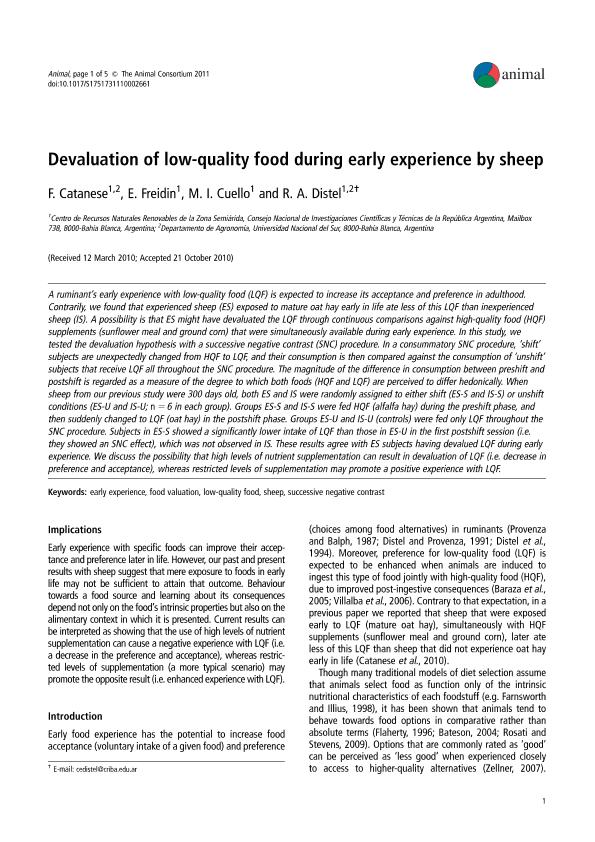Mostrar el registro sencillo del ítem
dc.contributor.author
Catanese, Francisco Hernan

dc.contributor.author
Freidin, Esteban

dc.contributor.author
Cuello, Marina Ines

dc.contributor.author
Distel, Roberto Alejandro

dc.date.available
2017-06-30T21:00:31Z
dc.date.issued
2011-06
dc.identifier.citation
Catanese, Francisco Hernan; Freidin, Esteban; Cuello, Marina Ines; Distel, Roberto Alejandro; Devaluation of low-quality food during early experience by sheep; Cambridge University Press; Animal; 5; 6; 6-2011; 938-942
dc.identifier.issn
1751-7311
dc.identifier.uri
http://hdl.handle.net/11336/19346
dc.description.abstract
A ruminant's early experience with low-quality food (LQF) is expected to increase its acceptance and preference in adulthood. Contrarily, we found that experienced sheep (ES) exposed to mature oat hay early in life ate less of this LQF than inexperienced sheep (IS). A possibility is that ES might have devaluated the LQF through continuous comparisons against high-quality food (HQF) supplements (sunflower meal and ground corn) that were simultaneously available during early experience. In this study, we tested the devaluation hypothesis with a successive negative contrast (SNC) procedure. In a consummatory SNC procedure, ‘shift’ subjects are unexpectedly changed from HQF to LQF, and their consumption is then compared against the consumption of ‘unshift’ subjects that receive LQF all throughout the SNC procedure. The magnitude of the difference in consumption between preshift and postshift is regarded as a measure of the degree to which both foods (HQF and LQF) are perceived to differ hedonically. When sheep from our previous study were 300 days old, both ES and IS were randomly assigned to either shift (ES-S and IS-S) or unshift conditions (ES-U and IS-U; n = 6 in each group). Groups ES-S and IS-S were fed HQF (alfalfa hay) during the preshift phase, and then suddenly changed to LQF (oat hay) in the postshift phase. Groups ES-U and IS-U (controls) were fed only LQF throughout the SNC procedure. Subjects in ES-S showed a significantly lower intake of LQF than those in ES-U in the first postshift session (i.e. they showed an SNC effect), which was not observed in IS. These results agree with ES subjects having devalued LQF during early experience. We discuss the possibility that high levels of nutrient supplementation can result in devaluation of LQF (i.e. decrease in preference and acceptance), whereas restricted levels of supplementation may promote a positive experience with LQF.
dc.format
application/pdf
dc.language.iso
eng
dc.publisher
Cambridge University Press

dc.rights
info:eu-repo/semantics/openAccess
dc.rights.uri
https://creativecommons.org/licenses/by-nc-nd/2.5/ar/
dc.subject
Early Experience
dc.subject
Food Valuation
dc.subject
Low Quality Food
dc.subject
Sheep
dc.subject
Successive Negative Contrast
dc.subject.classification
Otras Psicología

dc.subject.classification
Psicología

dc.subject.classification
CIENCIAS SOCIALES

dc.subject.classification
Ganadería

dc.subject.classification
Producción Animal y Lechería

dc.subject.classification
CIENCIAS AGRÍCOLAS

dc.title
Devaluation of low-quality food during early experience by sheep
dc.type
info:eu-repo/semantics/article
dc.type
info:ar-repo/semantics/artículo
dc.type
info:eu-repo/semantics/publishedVersion
dc.date.updated
2017-05-02T18:58:49Z
dc.journal.volume
5
dc.journal.number
6
dc.journal.pagination
938-942
dc.journal.pais
Reino Unido

dc.journal.ciudad
Cambridge
dc.description.fil
Fil: Catanese, Francisco Hernan. Consejo Nacional de Investigaciones Científicas y Técnicas. Centro Científico Tecnológico Conicet - Bahía Blanca. Centro de Recursos Naturales Renovables de la Zona Semiarida. Universidad Nacional del Sur. Centro de Recursos Naturales Renovables de la Zona Semiarida; Argentina
dc.description.fil
Fil: Freidin, Esteban. Consejo Nacional de Investigaciones Científicas y Técnicas. Centro Científico Tecnológico Conicet - Bahía Blanca. Centro de Recursos Naturales Renovables de la Zona Semiarida. Universidad Nacional del Sur. Centro de Recursos Naturales Renovables de la Zona Semiarida; Argentina
dc.description.fil
Fil: Cuello, Marina Ines. Consejo Nacional de Investigaciones Científicas y Técnicas. Centro Científico Tecnológico Conicet - Bahía Blanca. Centro de Recursos Naturales Renovables de la Zona Semiarida. Universidad Nacional del Sur. Centro de Recursos Naturales Renovables de la Zona Semiarida; Argentina
dc.description.fil
Fil: Distel, Roberto Alejandro. Consejo Nacional de Investigaciones Científicas y Técnicas. Centro Científico Tecnológico Conicet - Bahía Blanca. Centro de Recursos Naturales Renovables de la Zona Semiarida. Universidad Nacional del Sur. Centro de Recursos Naturales Renovables de la Zona Semiarida; Argentina
dc.journal.title
Animal

dc.relation.alternativeid
info:eu-repo/semantics/altIdentifier/doi/http://dx.doi.org/10.1017/S1751731110002661
Archivos asociados
